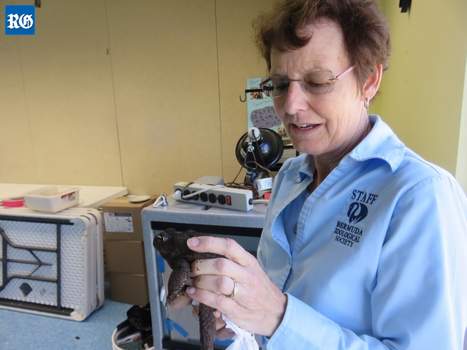Recent News
Flagler College visits Bermuda for Field ExperienceWednesday, July 01, 2015
Though only a small private college located in St. Augustine, Florida, Flagler College has some big dreams for their students in regards to protecting and conserving the environment.
Students facing their fears through Kids on the Reef
Wednesday, July 01, 2015
Awakening a sense of the wonder of the natural world in the lives of students is a vital component of the BZS Education programmes.
Reef Life HD featured on Bermuda Stamps
Wednesday, July 01, 2015
The stunning photography that is the focus of the BZS’s Bermuda Reef Life HD app will now be featured on letters and parcels posted around the world as the Bermuda Philatelic Bureau launched a new set of Bermuda Reef Fish stamps on May 21st.
Breeding Success! Tawny Frogmouth Chicks
Wednesday, July 01, 2015
There has been a lot of excitement in the Zoo over the past few months with the birth of three Tawny Frogmouth chicks.
Trunk Island Project 101 – Clearing the Invasives
Wednesday, July 01, 2015
The BZS purchase of the cottage and 2.4 acres on Trunk Island is a visionary achievement that compliments the educational mission of the BZS in so many ways.
About
GovernanceAbout Us
Newsletter
Latest News
Gift & Bookstore
Contact
General Inquiries
info@bzs.bm
Latest News
All the latest updates and news from the Bermuda Aquarium, Museum, and Zoo, one of Bermuda's leading visitor attractions!
Jonathan Bell
Published May 10, 2018 at 8:00 am (Updated May 10, 2018 at 6:53 am)

Combination of factors: Jamie Bacon, a researcher and educator for the
Bermuda Zoological Society, looks after a toad exhibiting
deformities from pollution (Photograph by Jonathan Bell)
Bermuda’s “safest form of pest control” is under threat from water pollution, a researcher who has tracked the island’s cane toad population for about 20 years warned yesterday.
Jamie Bacon, the principal investigator for the Bermuda Amphibian Project, run by the Bermuda Zoological Society, said a fall in the toad population meant a boom for nuisances such as centipedes. Dr Bacon added: “I wouldn’t be surprised if centipedes are able to move into areas where they haven’t been before.”
She said cane toads were rare in the East End of the island, so centipedes thrived as a result.
Dr Bacon added the insects often invaded homes and can deliver a painful sting.
Dr Bacon said she had heard centipedes had appeared in new locations such as Somerset and Spanish Point, although there was no data to show the extent of their spread.
Dr Bacon, an education officer at the Bermuda Aquarium, Museum and Zoo, has spent 20 years tracking cane toad deformities caused by hydrocarbon pollution.
The BZS’s wetland research has found a variety of other contaminants — including toiletries and antibiotics that have worked their way into island ponds after being flushed down toilets.
Dr Bacon said: “It shows you that what comes out of our cesspits does not go straight down, but can move laterally in the water table.”
A combination of factors have hit the island’s cane toads, a major consumer of insects like cockroaches, which were introduced to the island in the 19th century.
The amphibians secrete poison that makes their eggs and tadpoles toxic to most predators.
But the young toads that make their way on to land are prey for birds, particularly another introduced species, the yellow-crowned night heron.
Dr Bacon said: “We’ve also lost a lot of cane toad breeding sites, so that when the cane toads in your yard die off, there are often no places nearby where toads migrate from to replace them.”
Dr Bacon added: “We don’t know yet what effects the toiletries might be causing, but we feel they aren’t having nearly the effect that we see with the hydrocarbons and metals which are at much higher concentrations.”
Cane toads, the world’s largest species, originated in South America but have been introduced worldwide to eat agricultural pests — and have become pests themselves.
Bermuda’s cane toads began to show deformities in 1998 traced to hydrocarbon pollution, which also interfered with their ability to reproduce.
The zoological society has run a wetlands remediation programme that won support from HSBC in 2014, and has cleaned up Cloverdale Pond in Smith’s and Evans Pond in Southampton. Dr Bacon warned: “This is what we’re seeing in wildlife — keep your eye on anything like this happening to people.”
Tadpoles can be collected at this time of year from toad breeding sites and raised for release into gardens, as long as there are wet places for them to take cover during the day.
Dr Bacon said medicines can be burnt or disposed of at pharmacies instead of flushing them down toilets. She added: “You can also use the least toxic pesticides that you can.”


